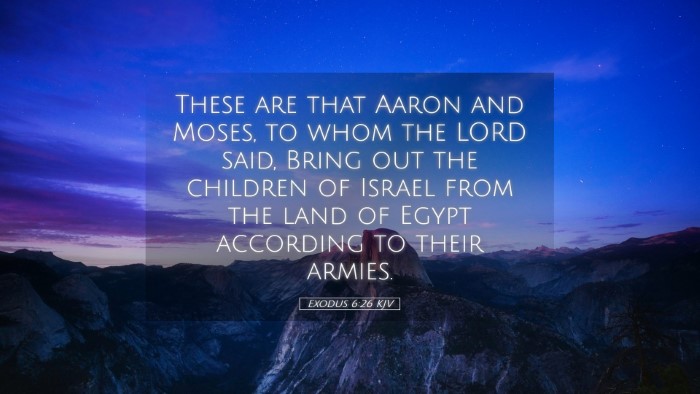Exodus 6:26 — Commentary and Insights
Verse Reference: Exodus 6:26 - "These are the same Aaron and Moses to whom the Lord said, 'Bring the Israelites out of Egypt by their divisions.'
Contextual Overview
The text of Exodus 6:26 is situated within a significant narrative concerning God's covenant with Israel and His promise of deliverance from bondage in Egypt. This verse serves to reestablish the roles of Moses and Aaron as central figures in the divine plan for liberation. Their lineage and divine appointment are crucial for understanding their authority and mission.
Commentary Insights
Matthew Henry's Commentary
Henry emphasizes the importance of Moses and Aaron in God’s plan for delivering the Israelites. He notes that God chooses to use these two men, despite their initial reluctance. The mention of their names reinforces their significance in the narrative, underscoring how God utilizes individuals to fulfill His promises.
- Divine Appointments: Henry relates how God often chooses the humble and seemingly inadequate to accomplish great things, showcasing His power through weakness.
- Historical Context: The reference to Israel’s divisions points to a structured approach to the exodus, suggesting God’s order amidst chaos.
- Encouragement of Faith: This verse serves as a reminder to leaders and followers alike of their roles in fulfilling God’s will, encouraging persistence in faith despite obstacles.
Albert Barnes' Notes on the Bible
Barnes’ commentary highlights the importance of Moses and Aaron's relationship and their divine commission. He explicates how the designation of "divisions" indicates that God intended to lead the Israelites out systematically, rather than in disorderly fashion.
- Covenantal Assurance: Barnes points out that this verse reassures the Israelites of God's continued presence and guidance through Moses and Aaron.
- Leadership Dynamics: The dynamic between Moses and Aaron is explored, emphasizing how their partnership exemplifies God's method of implementing His plans through collaborative leadership.
- Preparation for Deliverance: Barnes anticipates the events that follow, noting how this command sets the stage for the dramatic exodus and the miracles that will accompany it.
Adam Clarke's Commentary
Clarke provides a deeper analysis of the genealogical lineage of Moses and Aaron, which underscores their legitimate claim to divinely ordained leadership.
- Genealogy and Authority: Clarke remarks on the importance of genealogy in establishing authority, highlighting that their Levite heritage positions them uniquely for their roles.
- Divine Initiative: Clarke emphasizes that it is God who initiates the deliverance, anticipating the objections and hesitations Moses expressed earlier in the text.
- Structure of the Exodus: He suggests that the mention of divisions suggests a strategic and methodical divine plan, which would encourage orderly progression in their release from captivity.
Theological Implications
Exodus 6:26 carries profound theological implications regarding God’s sovereignty, the role of leadership in fulfilling divine plans, and the providential care God extends towards His people.
- God's Sovereignty: The verse illustrates God's absolute authority in directing history and using individuals as instruments of His will.
- Leadership in Community: The roles of Moses and Aaron model servant leadership, which is central to the Christian faith; leaders must rely on God and work in unity.
- Covenant Relationship: The insistence on “these are the same” links back to God's covenant with Abraham, Isaac, and Jacob, affirming His faithfulness to His promises across generations.
Practical Applications
This passage encourages contemporary readers, particularly leaders within the Church, to reflect deeply on their roles as vessels of God’s purpose:
- Trust in Divine Appointment: Leaders should recognize their selection by God, leading with confidence in the roles they have been called to.
- Working in Unity: Like Moses and Aaron, working collaboratively in leadership is essential in achieving communal goals and fulfilling divine missions.
- Encouragement Amidst Trials: This verse encourages believers to remain steadfast during trials, knowing that God has a plan and that He uses hardships for greater purposes.
Conclusion
Exodus 6:26 is a vital reminder that God orchestrates history through individuals and communities. The insights from the commentaries encourage believers, pastors, and scholars alike to engage with the text deeply, uncovering layers of meaning while trusting in God's unwavering commitment to His people.


